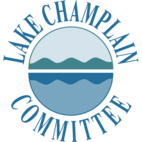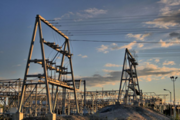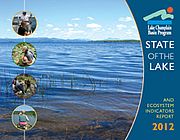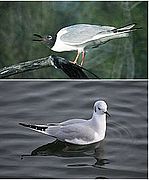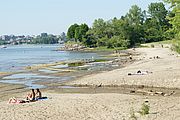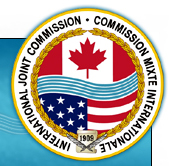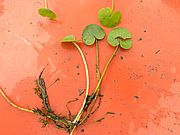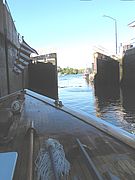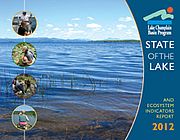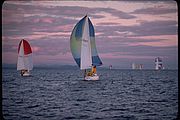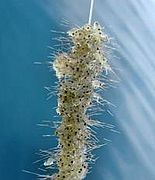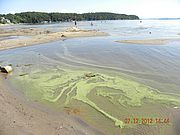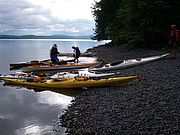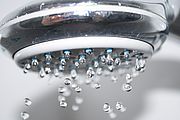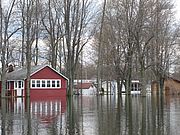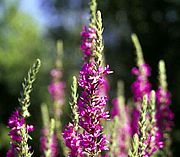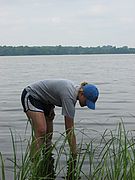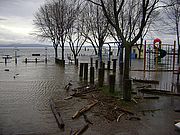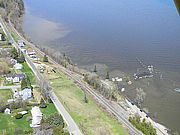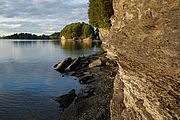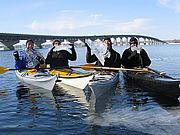Two recent proposals have shown that Lake Champlain is likely to be in the center of our region’s future energy transmission network. One project proposes to lay a power line at the bottom of Lake Champlain to transmit energy from large hydro-electric dams in northern Quebec to power-hungry consumers in the New York City region. MORE Read...
News from Selected Category
How is Lake Champlain doing? The Lake Champlain Basin Program released a new State of the Lake report this summer that helps answer that question. The State of the Lake comes out every three to four years to report on progress meeting water protection and restoration goals, track changes in the lake’s condition, and answer frequently asked questions. MORE Read...
The spiny waterflea, an invasive plankton species, was found in Lake George in early August. The species was found from at least four different locations in the lake in both the South Basin and in northern stretches. Now they have a direct connection to Lake Champlain from Lake George via the LaChute River. MORE Read...
Plattsburgh New York residents can safely dispose of expired, un-used or unwanted medications thanks to a new drug drop box located at the City Police Department on 45 Pine Street. The drop box was initiated by Plattsburgh Police Chief Desmond Racicot and Lt. Pat Rascoe after they saw one displayed at an international police chief’s conference earlier this year. MORE Read...
Starting in August and through the migration period, Lake Champlain’s smallest gull arrives, the Bonaparte’s gull. These are small graceful gulls with slender black beaks that sometimes act like terns, diving into the water. During the breeding season they sport an all black head. MORE Read...
What a difference a year makes! While the spring of 2011 brought record high lake levels, the summer of 2012 will be remembered for how low the lake dropped. As of August 31 the lake stood at 94.19 feet, about a foot and a half below average for this time of year. This is the lowest the lake has been since January of 2002. MORE Read...
The International Joint Commission (IJC) has been charged with defining a scope of work for a study or studies needed to address lake flooding. The charge follows record lake flooding in the spring of 2011. The IJC recently held public hearings in Saint-Paul-de-I’lle-aux-Noix, Quebec and North Hero, Vermont. MORE Read...
The Lake Champlain Committee continues our collaboration with Arrowwood Environmental to map vegetation in Lake Champlain, identify invasive species populations, and eradicate any newly established populations. In addition we will produce maps of the plant communities present. MORE Read...
When New York Governor Andrew Cuomo was still Attorney General, he weighed in on the side of Michigan when they called for Illinois to sever a century-old Chicago Canal because of the threat that Asian carp would move from the Mississippi River drainage into the Great Lakes drainage. Now, Lake Champlain is threatened by an invasive species, the spiny waterflea, which is found in the Champlain Canal. MORE Read...
The spiny waterflea, an invasive plankton species, was found in Lake George in early August. The species was found from at least four different locations in the lake in both the South Basin and in northern stretches. Now they have a direct connection to Lake Champlain from Lake George via the LaChute River. MORE Read...
How is Lake Champlain doing? The Lake Champlain Basin Program released a new State of the Lake report this summer that helps answer that question. The State of the Lake comes out every three to four years to report on progress meeting water protection and restoration goals, track changes in the lake’s condition, and answer frequently asked questions. MORE Read...
LCC is now on Facebook! We invite you to 'like' LCC's Facebook page. It's a great way to get the latest lake news, blue-green algae monitoring updates, beautiful lake photos, and other engaging content. MORE Read...
Watch LCC on Channel 17's Live at 5:25PM program if you weren't able to catch the original show. LCC staff discuss Lake Champlain water quality issues, blue-green algae and aquatic invasive species. MORE Read...
LCC’s work depends on the financial support of people and businesses that care about the lake and invest in our efforts to protect water quality, safeguard natural habitats and enhance recreational access. Our heartfelt thanks to the members who renewed, or joined between 04/01/12-06/30/12. MORE Read...
Earlier this month the spiny waterflea was confirmed in the Champlain Canal and the Glens Falls feeder canal. The spiny waterflea is an invasive plankton species native to Eurasia. The Champlain Canal is directly connected to Lake Champlain in Whitehall, so this invasive is now at our doorstep and, without immediate action, could soon enter the lake. MORE Read...
LCC’s blue-green algae monitoring program, now in its ninth year, got underway earlier this month. Thanks to a grant from Green Mountain Coffee Roasters, over 50 volunteers are checking water conditions on a weekly basis at more than 50 shoreline locations. MORE Read...
For many years, the New York State Department of Environmental Conservation has warned anglers that consuming yellow perch, brown bullhead, or American eel caught in Cumberland Bay posed a risk to their health. This year perch and bullhead were removed from the list. The perch and bullhead are now considered safe to eat because of actions taken over a decade ago to dredge PCB-laden sediments from the bay. MORE Read...
Do you have ideas for how we can commemorate half a century of lake advocacy? We want to hear from you. Volunteer opportunities abound in planning our 2013 birthday party. LCC was instrumental in working for Lake Champlain's health and accessibility in its first 50 years. MORE Read...
LCC is seeking site stewards for several locations along the Paddlers’ Trail. Stewards visit Trail sites at least once a month during the paddling season to check on conditions, pick up trash and report their findings to LCC. MORE Read...
Everything from fixing the leaks in your house to changing the watering patterns of your lawn can add up to big water savings. If you wonder whether the small changes you make really matter, consider this: each of us uses an average of 100 gallons of water per day – enough to fill 1,600 drinking glasses! Learn some tips to save water. MORE Read...
The Vermont Legislature passed and Governor Shumlin signed a bill that would prohibit fracking in Vermont. Lawmakers deliberated on a three-year moratorium but ultimately opted for a ban. LCC testified in favor of the legislation and strongly supported the prohibition. MORE Read...
The Vermont legislature ended up merging and then passing lake and river bills that had been considered during the session. The larger bill institutes a suite of programs that will help Vermont prepare for and cope with future flooding issues. MORE Read...
The New York legislature passed a bill introduced by Assemblywoman Sayward and Senator Little, to allow the Department of Environmental Conservation to help stop the spread of invasive species. MORE Read...
We're looking for a few high quality items to help our office and field work hum along more smoothly. Do you have any items on LCC's wishlist you'd like to donate? MORE Read...
Now in it's ninth year, the Lake Champlain Committee's Blue-Green Algae Monitoring Program is in full swing with over 100 individuals trained on how to identify this potentially toxic form of cyanobacteria. Learn more about how you can become involved as a volunteer monitor. MORE Read...
LCC Staff Scientist Mike Winslow and Burlington Free Press environmental reporter Candy Page discuss the short and long-term impacts of the flooding and the interest that's been kindled in "flood control" with VPR's Jane Lindholm. Read...
The International Joint Commission (IJC) has been asked to develop a plan of study concerning the record flooding of Lake Champlain and its tributaries, and of the Richelieu River which occurred in Spring 2011. In letters from the Governments of the United States and Canada, IJC is being asked to develop a study proposal which would examine the causes and impacts of flooding, as well as the full range of measures to prepare for, prevent and mitigate such impacts. MORE Read...
LCC’s work depends on the financial support of people and businesses that care about the lake and invest in our efforts to protect water quality, safeguard natural habitats and enhance recreational access. MORE Read...
On March 9, 2012 a field hearing of the House Agriculture Committee convened in Saranac Lake, NY to hear from agriculture producers on their views of the Federal Farm Bill. Every five years Congress has to reauthorize the federal Farm Bill. The current version expires at the end of September, so this year’s reauthorization coincides with an election year. The labyrinthine complexities of the bill are stupefying, but three areas stand out in their importance to protecting water quality in Lake Champlain: conservation programs, supply management, and support for diversified agriculture. MORE Read...
Even if air temperatures seem balmy, the lake takes much longer to warm up. Additionally, strong currents and springtime debris are potential marine hazards this time of year. Lake Champlain temperatures are still in the 30s. If you are immersed in water that cold, exhaustion and unconsciousness can set in after 15 minutes. MORE Read...
